Related Research Articles
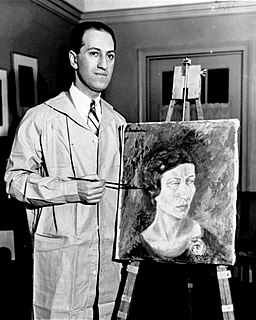
George Gershwin was an American composer, pianist and painter whose compositions spanned both popular and classical genres. Among his best-known works are the orchestral compositions Rhapsody in Blue (1924) and An American in Paris (1928), the songs "Swanee" (1919) and "Fascinating Rhythm" (1924), the jazz standard "I Got Rhythm" (1930), and the opera Porgy and Bess (1935), which gave birth to the hit "Summertime".

Rhapsody in Blue is a 1924 musical composition by the American composer George Gershwin for solo piano and jazz band, which synthesizes elements of classical music with jazz-influenced effects. The composition was commissioned at the request of bandleader Paul Whiteman. The piece received its premiere in the concert, "An Experiment in Modern Music," which was held on February 12, 1924, in Aeolian Hall, New York City, by Whiteman and his band with Gershwin playing the piano. The work was orchestrated by Ferde Grofé several times, including the original 1924 scoring, the 1926 "theater orchestra" setting, and the 1942 symphony orchestra scoring.
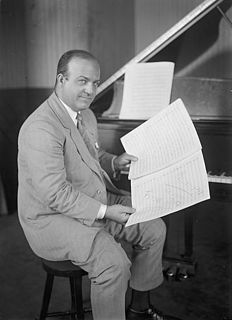
Ferdinand Rudolph von Grofé, known as Ferde Grofé was an American composer, arranger, pianist and instrumentalist. He is best known for his 1931 five-movement tone poem, Grand Canyon Suite.
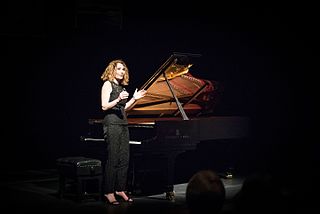
Joanna Clare MacGregor is a British concert pianist, conductor, composer, and festival curator. She is Head of Piano at the Royal Academy of Music and a professor of the University of London. She is currently artistic director of the International Summer School & Festival at Dartington Hall.
Concerto in F is a composition by George Gershwin for solo piano and orchestra which is closer in form to a traditional concerto than his earlier jazz-influenced Rhapsody in Blue. It was written in 1925 on a commission from the conductor and director Walter Damrosch. It is just over half an hour long.

Robert Russell Bennett was an American composer and arranger, best known for his orchestration of many well-known Broadway and Hollywood musicals by other composers such as Irving Berlin, George Gershwin, Jerome Kern, Cole Porter, and Richard Rodgers.

Derek Paravicini is an English autistic savant known as a musical prodigy. He resides in London.
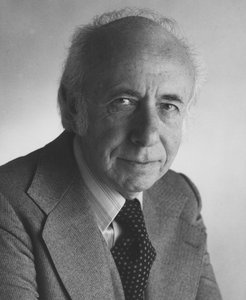
Morton Gould was an American composer, conductor, arranger, and pianist.

Jack Gibbons is an English classical composer and virtuoso pianist.
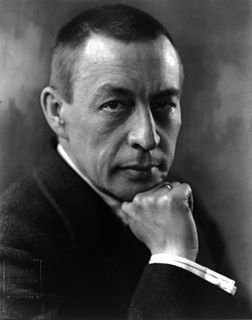
Piano Concerto No. 4 in G minor, Op. 40, is a major work by Russian composer Sergei Rachmaninoff, completed in 1926. The work exists in three versions. Following its unsuccessful premiere, the composer made cuts and other amendments before publishing it in 1928. With continued lack of success, he withdrew the work, eventually revising and republishing it in 1941. The original manuscript version was released in 2000 by the Rachmaninoff Estate to be published and recorded. The work is dedicated to Nikolai Medtner, who in turn dedicated his Second Piano Concerto to Rachmaninoff the following year.
Arthur Leslie Benjamin was an Australian composer, pianist, conductor and teacher. He is best known as the composer of Jamaican Rumba (1938) and of the Storm Clouds Cantata, featured in both versions of the Alfred Hitchcock film The Man who Knew Too Much (1934), (1956).
Jean-Yves Thibaudet is a French pianist.
Noriko Ogawa is a Japanese classical pianist, based in London.
Nadine Dana Suesse was an American musician, composer and lyricist.

Wayne Marshall is a British pianist, organist, and conductor.
The Orchestra of St John's is an orchestra in the United Kingdom, founded in 1967 by John Lubbock. Originally named after St John's, Smith Square in central London.

Matthew King is a British composer, pianist and educator. His works include opera, piano and chamber music, choral and orchestral pieces. He has been described, by Judith Weir, Master of the Queen’s Music, as “one of Britain's most adventurous composers, utterly skilled, imaginative and resourceful”.

Nobuyuki Tsujii is a Japanese pianist and composer. He was born blind due to microphthalmia, and his exceptional musical talent has propelled him to become a world renowned artist. Tsujii performs extensively, with a large number of conductors and orchestras, and has received critical acclaims as well as notices for his unique techniques for learning music and performing with an orchestra while being unable to see.

Conrad Yiwen Tao is an American composer and pianist and former violinist. Tao's piano and violin performances since childhood brought him early recognition at music festivals and competitions, and he is receiving critical praise for his recitals and concerts with symphony orchestras. At age 13, he was featured on the PBS TV series From the Top – Live from Carnegie Hall as violinist, pianist and composer. He won eight consecutive ASCAP Morton Gould Young Composer Awards. Among his compositions have been commissions by the New York Philharmonic, Hong Kong Philharmonic, Pacific Symphony and Dallas Symphony Orchestra.
Yuanfan Yang is a pianist and composer. He studied at Chetham's School of Music between 2008 and 2014, and is now studying in the Royal Academy of Music. In a review of one of Yuanfan's recitals, Stephen Wigler comments, “...exceptionally fine for a pianist of any age...brilliantly executed, beautifully organised, breathless in its excitement and deeply affecting in its sentiments”.
References
- ↑ "The Inner World of Music - BBC Radio 4". BBC. Retrieved 11 April 2018.
- ↑ "Derek Paravicini premieres new piano concerto and plays the Gershwin Rhapsody in Blue at South Bank". www.pianistmagazine.com. Archived from the original on 25 September 2017. Retrieved 11 April 2018.
- ↑ "Blind, autistic and a musical genius". BBC News. Retrieved 11 April 2018.
| | This article about a concerto is a stub. You can help Wikipedia by expanding it. |